By Ronan Battistoni
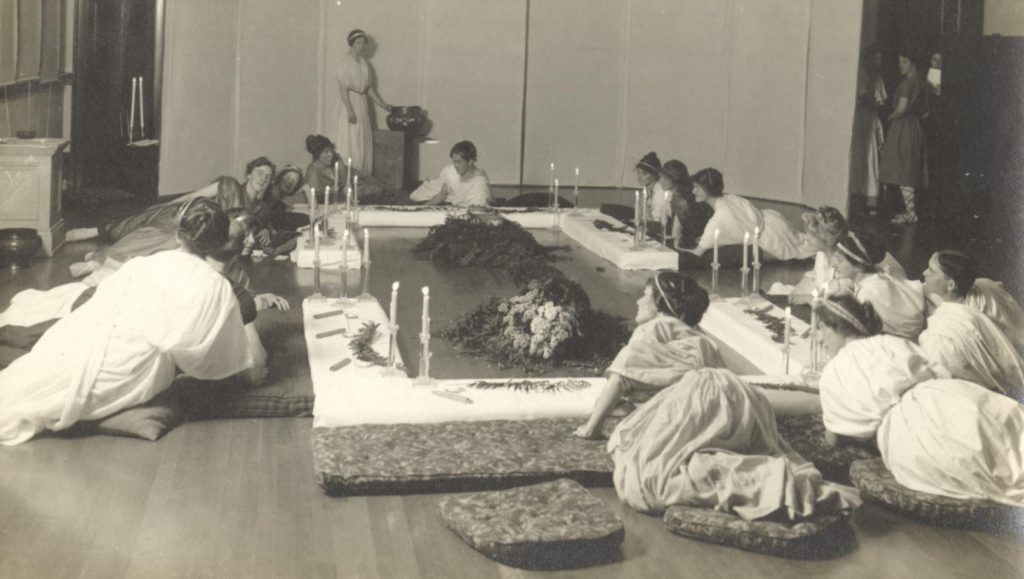
There are few things more iconic to Reed College than Humanities 110. At its best, the course defines the Reed experience: intellectual rigor, lively classroom discussions, and a preference for thoughtful feedback over grades. It is also one of the places where the conflict between Reed’s left-leaning student body and the institution’s insistence on maintaining its academic traditions becomes most clear.
Early Days: 1920s-1940s
The Humanities is rooted in the educational philosophy of Richard Scholz, Reed College’s president from 1921-24. Scholz aimed to introduce more structure to the educational program designed by his predecessor, William Foster, while maintaining academic rigor and interdisciplinary perspectives.
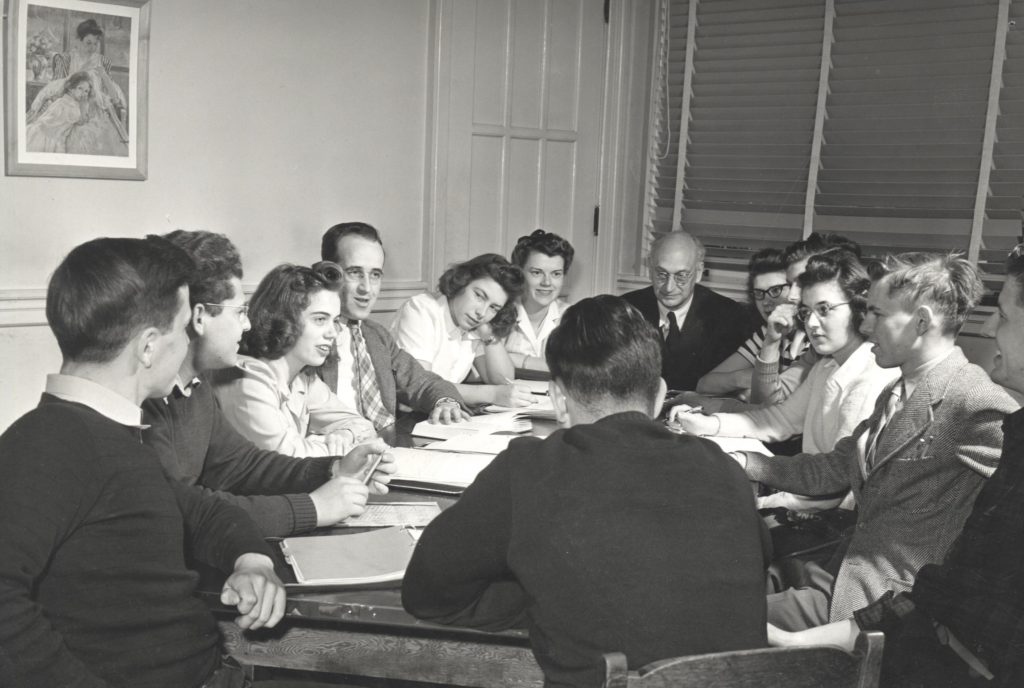
Under the Scholz presidency, students were required to take a pair of courses in their freshman year, one in history and one in literature. Each presented a broad survey of Western culture until about 1763 AD.1 By the mid-1940s, these courses were condensed into a single class: Humanities 11. In the fall semester, freshmen read the Greek and Roman canon, before shifting to medieval Europe in the spring. This structure remained virtually unchanged for thirty years.
Black Student Union Protests: 1960s
In the mid-1960s, the college received a $275,000 grant from the Rockefeller Foundation to fund minority recruitment. While the grant was successful at diversifying what had once been a homogeneously white student body, Black students reported a lack of support on campus and feelings of alienation from their white peers. This tension led to the creation of the Black Student Union (BSU), which organized for the creation of a Black Studies center and a reevaluation of the Humanities program.2
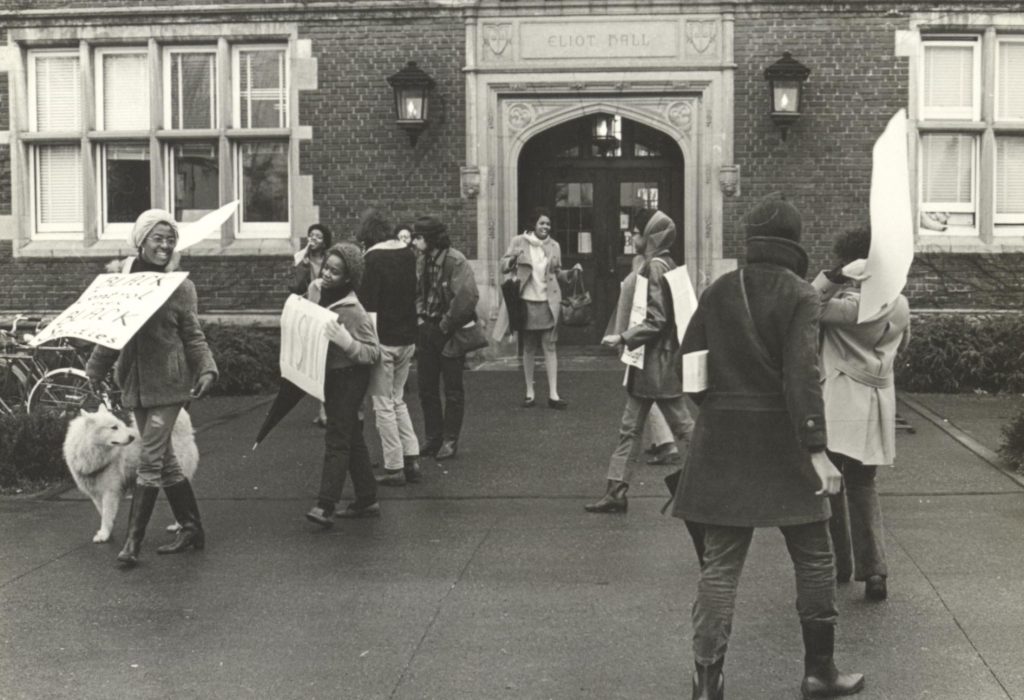
BSU’s frustrations with the classical Humanities syllabus reached their peak in 1969 when several Black freshmen began boycotting registration in the course. BSU representatives argued that “Black freshmen… did not want to take a course entitled ‘Humanities’ that omitted the contributions of black people to civilization.”3 While the BSU boycott never gained the traction to significantly impact the Humanities curriculum, it planted the seeds for an ongoing conversation regarding the pedagogy and content of the course.
Reed Union: 1970s
In early March of 1971, several freshmen staged a walkout during a Humanities lecture. While the walkout was apparently without warning (or clear demands), it led to the organization of a Reed Union* on the Humanities curriculum.4

Unfortunately, the Union was mired in a lack of clarity regarding exactly what students wanted from the Humanities. While faculty and administration focused on rebutting requests to do away with the Humanities requirement entirely, the majority of students were interested in building a more engaging and pointed curriculum.5
For several years following the protest, the Humanities curriculum saw an unprecedented level of experimentation. From 1973-78, freshman Humanities were split into three courses: 120, 130, and 140. All three were organized around the same areas and time periods (archaic and classical Greece in the fall, and Medieval and Renaissance-era Europe in the spring), but differed slightly in scope and theme.6
Despite adjustments to the syllabus, students remained unsatisfied. Some complained that the class was overdesigned, and too vast in scope to allow for any real depth.7 Continued dissatisfaction with the lack of real writing instruction led graduate student Julianne Murray to introduce a peer-review “dorm writing” program with the support of the college.8
By the end of the decade, the three-track system was phased out and replaced with a version of the syllabus that was nearly identical to the 1960s curriculum.
New Perspectives: 2000s
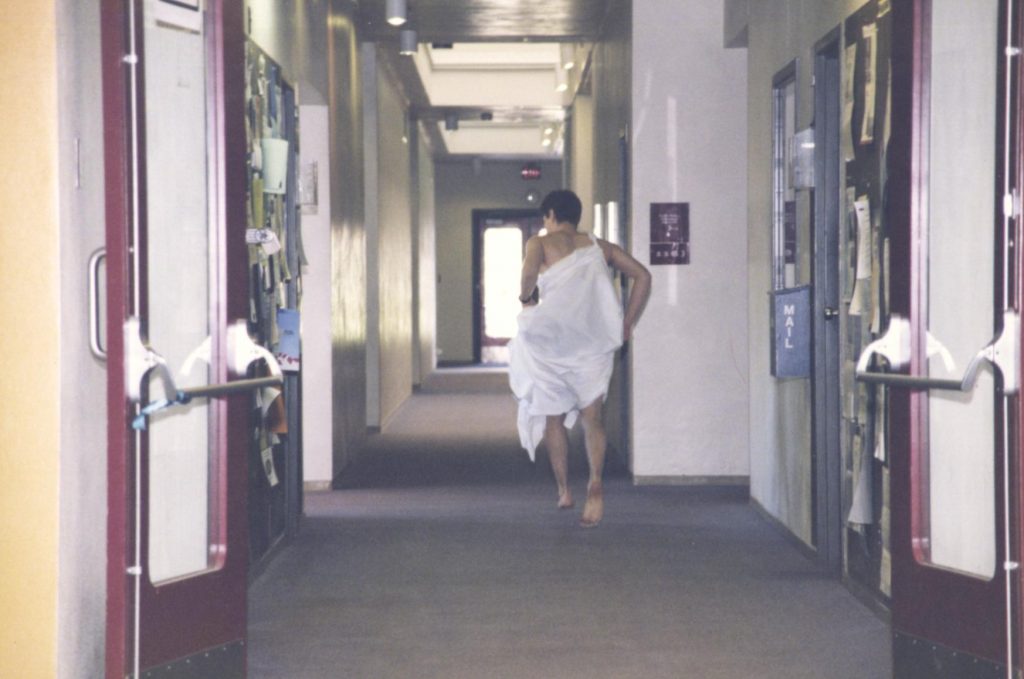
By the early 2000s, the bulk of criticism came from within the Humanities faculty rather than students. One party sought to hold onto traditional texts while recontextualizing old materials and incorporating secondary sources more in line with a modern understanding of the classical world. This view was advocated by Philosophy professor Peter Steinberger in a 2004 Reed Magazine article, in which he referred to Humanities as “a matter of new wine poured into old bottles.”9
Others sought a much more drastic overhaul of the syllabus. A 2008 internal review of the Humanities program points to the events of September 11, 2001, as the catalyst for faculty’s growing desire to incorporate more diverse materials, especially from the Islamic world. Some suggestions included a more directly comparative syllabus (for example, a unit on epics might feature Gilgamesh, Genesis and Exodus, the Iliad, and the Aeneid) or a shift from classical Greece and Rome to another time period, civilization, or cosmopolitan center.
None of these suggestions made it off the drawing board. Objections included “the potential paucity of texts in each of these syllabi” and their lack of canonical relevance, as well as a reluctance to cast off the expertise of experienced Humanities faculty. While the writers of the report eventually came to the decision to continue the study of Greece and Rome, their attitude toward it reads as ambivalent at best. By this point, it seems to have been clear to students and faculty alike that the persistence of Classical studies in Humanities was at least on some level a case of “institutional inertia.”10
Reedies Against Racism: 2010s
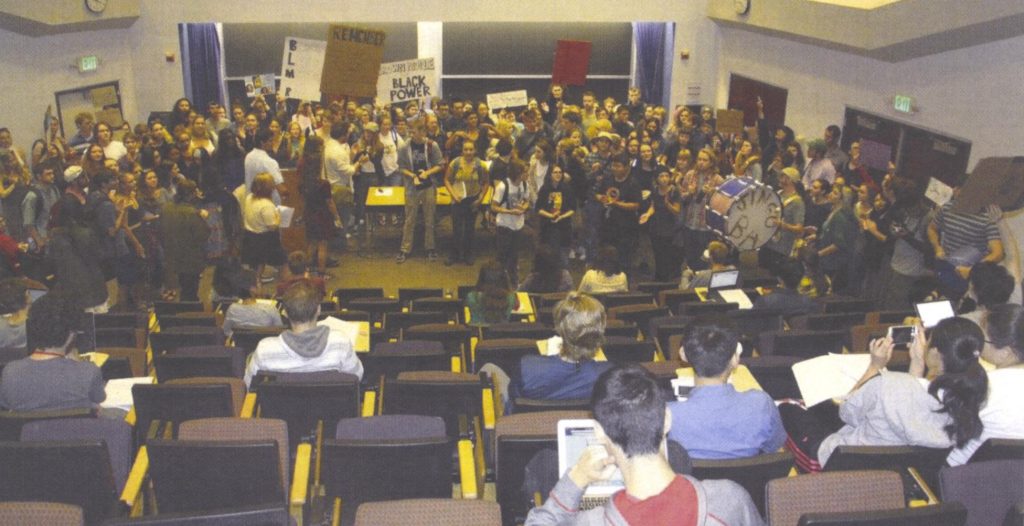
By 2016, long-simmering tensions within Humanities 110 reached a turning point as protests led by the student group Reedies Against Racism (RAR) broke national news. RAR had many demands: they wanted the campus designated as a legal sanctuary for immigrants, better support services for students of color, divestment from the college’s operating bank Wells Fargo, and a revival of the long-defunct ethnic studies program. But at the center of the discourse–both off and on-campus–lay a single, polarizing request: a fundamental reevaluation of the Humanities 110 syllabus.12
RAR advocates were ultimately successful at convincing the administration to move their periodic review of the Humanities program forward by a few years. By 2018, the spring semester of the Humanities curriculum had been completely overhauled to incorporate two new modules: one focused on Mexico City, and another on the Harlem Renaissance.13
What Comes Next?
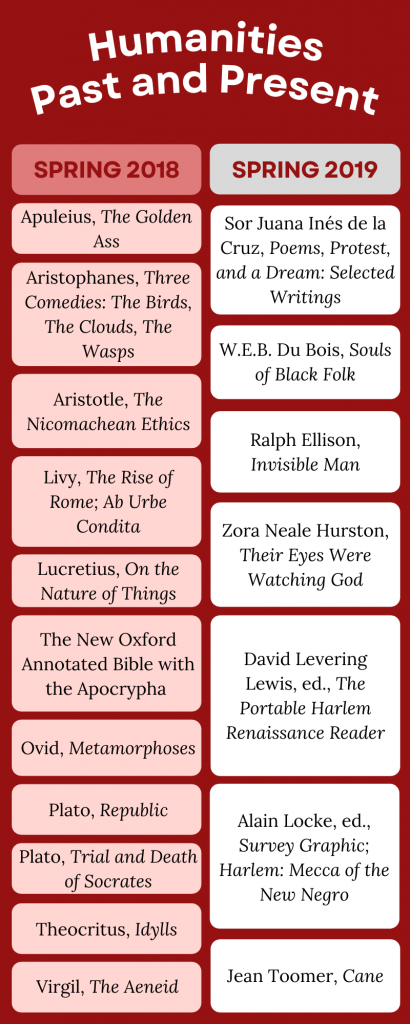
While the new syllabus seems to have resolved some concerns about the lack of diversity in Humanities, new challenges have come to the fore. The Religion department–a long-standing pillar of Humanities lecturers–withdrew from the course entirely in 2018. Religion professor Kambiz GhaneaBassiri explained the department’s reasoning in a Quest interview, in which he argued that the new, modular curriculum was too broad and “[did] not allow [time] for close examination of relationships between different people, societies, and cultures.” As a possible solution, GhaneaBassiri proposed a tighter syllabus, still classically focused but more diverse in scope, which could emphasize interactions between the Persian empire, India, Central Asia, Greece, and Europe.14
Students have filed a number of complaints of their own. A number of reflections printed in the Quest since 2018 bemoan the emphasis on form over content, the use of colonial texts,15 and a general lack of self-criticism in conferences regarding approaches to potentially triggering texts.16 Others echo the Religion department’s concerns about the limited amount of time allowed for each module.17
Of course, it’s not all bad: the incorporation of different mediums (including films and music), as well as increased opportunities to issues like gender, sexuality, and ethnicity in a relatively contemporary context, have been well received by students and seem to have improved engagement in the course. The sheer volume of Humanities discourse in the Quest implies that, at the very least, the course is doing its job at shaping Reedies into powerful critical thinkers.
Interested in learning more about the Humanities or RAR? Reach out to us–we’d love to hear from you! The archives team can be contacted at archives@reed.edu.
* Reed Unions are panel-style discussions between students, faculty, and administration. Most recently, community members discussed Reed’s divestment policy and response to the climate crisis at a Reed Union in 2020. While Reed Unions have no formal authority, they are a valuable avenue for communication between students, faculty, and administration who are often isolated from each other.
[1] Internal review of the Humanities 110 program. October 31, 2008.
[2] “The Struggle for Black Studies.” An Identity Crisis: Images of Student Dissent at Reed, 1966-1972, https://blogs.reed.edu/an-identity-crisis/the-struggle-for-black-studies/.
[3] The Reed College Quest, September 10, 1969.
[4] The Reed College Quest, March 15, 1971.
[5] The Reed College Quest, March 21, 1971.
[6] Reed College catalog, 1974-1975. September 5, 1974.
[7] The Reed College Quest, April 11, 1975
[8] Julianne Murray, “Dorm Writing Group Project Report.” January 1980.
[9] Peter J. Steinberger, “The (Un)Changing Face of Hum 110.” Reed Magazine August 2004. https://www.reed.edu/reed_magazine/aug2004/features/hum_110/index.html
[10] Internal review of the Humanities 110 program. October 31, 2008.
[11] Brandon Zero, “Learning from the Past.” Reed Magazine, July 12, 2021. https://www.reed.edu/reed-magazine/articles/2021/reedies-against-racism-learn-from-the-past.html.
[12] Mary James, “Summary of Progress on Student Demands.” December 6, 2016.
[13] Humanities 110 syllabus, 2018. https://www.reed.edu/humanities/hum110/syllabus/.
[14] Elai Kobayashi-Solomon, “Losing Faith.” The Reed College Quest, September 14, 2018. https://reedquest.org/articles/losing-faith.
[15] Mud Bentley and Albert Kerelis, “Student Thoughts on Hum 110.” The Reed College Quest, March 19, 2021. https://reedquest.org/articles/humthoughts21
[16] Eva Goeke, “Lines Crossed.” The Reed College Quest, February 25, 2022. https://reedquest.org/articles/lines-crossed.
[17] Olivia Hicks, “Letter to the Editor: A Reflection On Humanities 110.” The Reed College Quest, April 30, 2021. https://reedquest.org/articles/humopinion.

